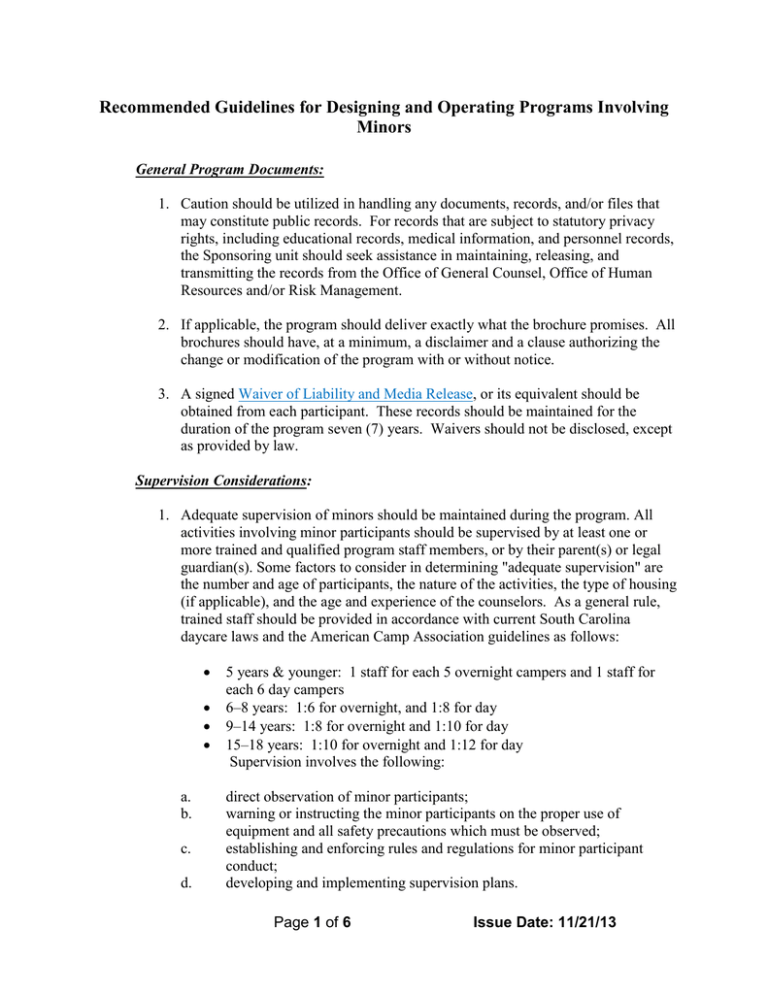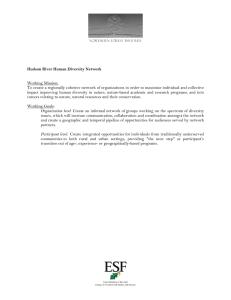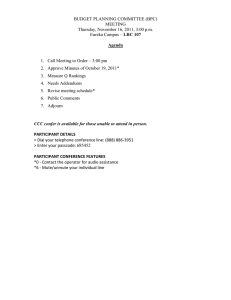Recommended Guidelines for Designing and Operating Programs Involving Minors
advertisement

Recommended Guidelines for Designing and Operating Programs Involving Minors General Program Documents: 1. Caution should be utilized in handling any documents, records, and/or files that may constitute public records. For records that are subject to statutory privacy rights, including educational records, medical information, and personnel records, the Sponsoring unit should seek assistance in maintaining, releasing, and transmitting the records from the Office of General Counsel, Office of Human Resources and/or Risk Management. 2. If applicable, the program should deliver exactly what the brochure promises. All brochures should have, at a minimum, a disclaimer and a clause authorizing the change or modification of the program with or without notice. 3. A signed Waiver of Liability and Media Release, or its equivalent should be obtained from each participant. These records should be maintained for the duration of the program seven (7) years. Waivers should not be disclosed, except as provided by law. Supervision Considerations: 1. Adequate supervision of minors should be maintained during the program. All activities involving minor participants should be supervised by at least one or more trained and qualified program staff members, or by their parent(s) or legal guardian(s). Some factors to consider in determining "adequate supervision" are the number and age of participants, the nature of the activities, the type of housing (if applicable), and the age and experience of the counselors. As a general rule, trained staff should be provided in accordance with current South Carolina daycare laws and the American Camp Association guidelines as follows: a. b. c. d. 5 years & younger: 1 staff for each 5 overnight campers and 1 staff for each 6 day campers 6–8 years: 1:6 for overnight, and 1:8 for day 9–14 years: 1:8 for overnight and 1:10 for day 15–18 years: 1:10 for overnight and 1:12 for day Supervision involves the following: direct observation of minor participants; warning or instructing the minor participants on the proper use of equipment and all safety precautions which must be observed; establishing and enforcing rules and regulations for minor participant conduct; developing and implementing supervision plans. Page 1 of 6 Issue Date: 11/21/13 2. A trained and qualified program staff member who is at least 21 years of age should be accessible to minor participants by phone or in person during all program activities. The staff member should reside in the housing unit, if applicable. Additional program staff should be assigned to limit one-on-one contact with minor participants and to ensure that appropriate levels of supervision are maintained. 3. If applicable, rules and regulations for proper supervision of minor participants in overnight accommodations should be established. The following should be included: a. Written permission signed by the parent/guardian for the minor to reside in University housing. b. Not more than one minor participant per bed. c. A curfew time which is age-appropriate for the minor participants, allowing at least eight (8) hours of sleep for participants. d. In-room visitation restricted to participants of the same gender. e. Guests of minor participants (including parents, guardians, and family members) are restricted to visitation in the building lobby, and only during approved hours specified by the program. f. Program compliance with all security measures and procedures specified by University Housing Services and Law Enforcement. 4. No minor participant should be released to any party other than the individual(s) listed in the section pertaining to custodial information on the Waiver of Liability and a Media Release, or its equivalent. Written procedures to address the release of minor participants from their program should be established. Program staff should verify the individual’s identity, preferably through a valid driver’s license. Staffing and Program Considerations: 1. Program staff having direct contact with minor participants should have a background check on record with the University at the time of hire and/or beginning work with minors. This background check should be reviewed and approved by the Sponsoring unit or Human Resources consistent with Human Resources Background and Employment Verification Check policy HR 1.90 (as revised) prior to hiring and/or allowing the staff member to have contact with minor participants. Additionally, all program staff that will have direct contact with minors should have a background check that is no older than 5 years. The background check should meet the standards of HR policy 1.90 to include: a social security verification check, a county, state and federal criminal conviction check, a sex and violent offender registry check, a driving record check, an employment reference check, and an employment verification check. Staff, paid or unpaid, with any history of a crime of violence, sex related offenses, or any offense which would indicate to a reasonable person that it would be inappropriate for the individual to work around minors, should not be allowed to serve in any program capacity. Page 2 of 6 Issue Date: 11/21/13 2. Program staff should: a. b. c. d. e. f. g. h. i. Limit one-on-one contact with minor participants: if possible, there should be two or more staff members present during activities where minor participants are present. Not have any inappropriate direct electronic (e.g. social networking websites, texting, email, etc.) contact with minor participants. Not enter a minor’s room, bathroom facility, or similar area without another staff member in attendance when providing overnight supervision of minor participants, unless there is an emergency. Stay in separate accommodations from minors and should not share bathroom accommodations with participants with exception made only for the minors’ parents or guardians when serving as program staff. Not engage in abusive conduct of any kind toward, or in the presence of, a minor participant. Not strikes, hit, or administer corporal punishment to, or touch in an inappropriate or illegal manner any minor participant. Not pick up minor participants from or drop off minors at their homes, other than the driver’s child(ren). Not provide alcohol, tobacco, or illegal drugs to any minor participant. Staff members should not provide prescription drugs or any medication to any minor participant unless specifically authorized in writing by the parent or legal guardian as being required for the minor’s care or the minor’s emergency treatment. Not make sexual materials in any form available to minor participants, or assist them in any way in gaining access to such materials. 3. Documented program staff training should be maintained for the duration of the program plus seven (7) years. Training for all program staff members should occur prior to the start of the program and include information about: a. b. c. d. e. f. g. h. i. j. k. Responsibilities and expectations; policies, procedures, and enforcement; Minimizing one-on-one contact with minor participants and appropriate supervision techniques during one-on-one contact; Appropriate crisis/emergency responses; safety and security precautions; Confidentiality issues involving minor participants; University responsibility/liability; How to request local emergency services; How to report suspected child abuse; Safety and security procedures; University rules, rules established by the program, behavioral expectations and how to enforce all rules; Sexual abuse awareness; Proper release of minor participants attending the program. Page 3 of 6 Issue Date: 11/21/13 4. An orientation session should be conducted for the minor participants to explain the program, all the applicable rules and regulations, and the consequences for violation of the program’s rules. Each program should make available to minor participants and parents/guardians the rules and discipline measures applicable to the program. Minor participants and staff should abide by all University regulations and should be removed from the program for non-compliance with rules. The following should be included in program rules: a. b. c. d. e. f. g. h. i. j. The possession or use of alcohol and other drugs, fireworks, guns and other weapons is prohibited. The operation of a University or personal motor vehicle by minors is prohibited during program hours. The parking of staff and participant vehicles must be in accordance with University parking regulations. Rules and procedures must be specified governing when and under what circumstances minor participants may leave University facilities during the program. No violence, including sexual abuse or harassment, will be tolerated. Hazing of any kind is prohibited. Bullying including verbal, physical, and cyber bullying is prohibited. No theft of property regardless of owner will be tolerated. No use of tobacco products will be tolerated. Misuse or damage of University facilities is prohibited. Charges will be assessed against those participants who are responsible for damage or misusing University facilities. The inappropriate use of cameras, imaging, and digital devices is prohibited including use of such devices in showers, restrooms, or other areas where privacy is expected by minor participants. Emergencies and Medical Considerations: 1. Written procedures should be established for emergencies and in the event a minor participant becomes ill or injured. A written incident report should be completed for any situations requiring medical or police intervention. 2. Access to emergency medical services at all program locations should be arranged. Medical care appropriate for the nature of the events, expected attendance and other variables should be determined and implemented prior to the event. 3. A written procedure for the notification of the minor participant’s parent/legal guardian in case of an emergency, including medical or behavioral problem, natural disasters, or other significant program disruptions should be developed. 4. If applicable, each minor participant should sign and return a Health and Emergency Information Form, or its equivalent. Program staff should maintain Page 4 of 6 Issue Date: 11/21/13 possession of such documents at all times during the program in a confidential and protected manner complying with all HIPPA requirements. 5. If applicable, each minor participant or their parent/guardian should sign and return the Consent and Declaration of Prescription Medication, Over-The-Counter Drugs, and Health and Medical Monitoring Devices Form, or its equivalent. Minor participants’ medicines may be distributed by program staff, under the following conditions: a. b. c. d. e. The minor participant’s family provides the medicine in its original pharmacy container labeled with the minor participant’s name, medicine name, dosage and timing of consumption. Over-the-counter medications must be provided in their manufacturers’ container. Staff should keep the medicine in a secure location, and at the appropriate time for distribution shall meet with the participant. The staff member should allow the minor participant to self-administer the appropriate dose as shown on the container. Any medicine which the minor participant cannot self-administer, should be stored and administered by a licensed healthcare professional associated with the campus or, if no one is available, arrangements must be made with another health care professional in advance of the minor participant’s arrival. The Sponsoring unit should consult with the location’s health service and the Office of Affirmative Action ADA Coordinator to discuss reasonable accommodations in the above situation. Personal “epi” pens, over-the-counter medications, birth control, and inhalers may be carried by the participant during activities. Travel Considerations: 1. A separate Field Trip Consent and Release Form, or its equivalent, form should be obtained from a parent or guardian of each minor participant for all field trips 2. Regardless of distance, transportation should be by University-obtained vehicle, and each vehicle should have a mode of communication (e.g. cellular phone). 3. All drivers must be certified / trained and have proper clearance to operate a vehicle transporting minor participants through the Vehicle Management department. 4. Minor participants under the age of eighteen (18) should not be transported in a fifteen (15) passenger van. 5. Programs more than fifteen (15) miles from campus, or off-campus overnight events should have one (1) staff member over the age of 21 for each thirty (30) minor participants, and one (1) trained staff member for each ten (10) minor participants. Page 5 of 6 Issue Date: 11/21/13 6. If applicable, a certificate of insurance should be obtained from the owner of the charter bus company evidencing coverage for General Liability for no less than $1M per occurrence, Automobile Comprehensive, Collision and Liability for no less than $1M combined single limit, and Workers’ Compensation insurance meeting state statutory limits. The University of South Carolina should be named as an additional insured on the certificate. Page 6 of 6 Issue Date: 11/21/13



